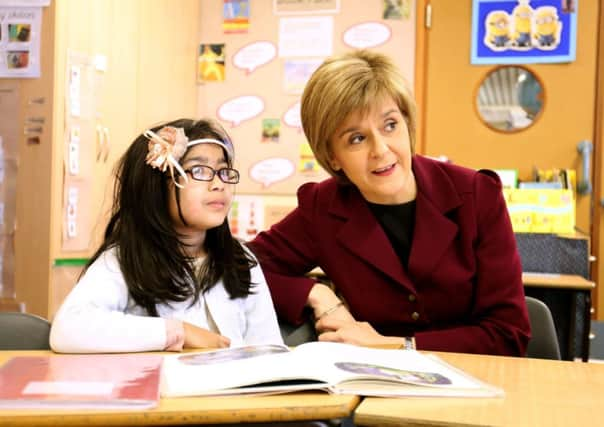Scots headteachers to face ‘leadership course’


Under the radical plan to improve standards in Scotland’s schools, prospective heads will have to undertake 18 month part-time courses on which they will learn management and administration skills.
The shake-up, to be introduced for both primary, secondary and special needs teachers from 2018-19, is based on the model of the “London Challenge”, which is widely credited with transforming pupil attainment and school leadership in the UK capital.
Advertisement
Hide AdAdvertisement
Hide AdMs Sturgeon said the plan would ensure the “best qualified people” are placed in charge of Scotland’s schools as she unveiled the reform during a visit to a school in East London yesterday.
The new compulsory qualification that will look at the “specificity of headship” has been designed by the Scottish College for Educational Leadership, launched by the government last year to “support leadership development at all levels for education practitioners across Scotland”.
Aspirant heads will complete 60 masters credits on the course that is still being designed, but which could include one-to-one coaching and mentoring, conferences in leadership training, as well as a professional interview on a candidate’s skills.
Ms Sturgeon suggested the scheme, which will be run by universities, would be a flagship part of the Scottish Government’s plan to boost attainment levels in Scotland’s schools in the coming years along similar lines to the London Challenge.
The London Challenge, launched in 2003, reportedly saw a dramatic rise in standards by encouraging collaboration between schools across the city.
Ms Sturgeon praised the “excellent leadership” in the initiative that is credited with turning round failing schools and ending the culture of failure that reportedly saw parents fleeing inner London to avoid sending their children to local schools.
She said: “I have now seen for myself, both in Scotland and here in London, how excellent leadership in schools can be key to their success. I want all schools to be led by the best-qualified people.
“Leadership has played a key role in improving attainment in London schools and just as the rest of the world learns from the best of Scotland’s education system, it is right that we learn the lessons from London on closing the attainment gap.
Advertisement
Hide AdAdvertisement
Hide Ad“Strong leadership and the best teachers are a fundamental part of improving attainment and achievement for children and young people.”
The First Minister said that introducing a masters qualification for headteachers in Scotland would “drive forward improvements on educational outcomes in the most disadvantaged communities”.
Glasgow’s school attainment record is the third worst, while Dundee’s the worst, the most recently published figures showed.
However, Ms Sturgeon suggested that the government’s plan to improve school leadership and drive-up standards would deliver similar improvements in Scotland’s major cities to those in London.
She added: “Last year, we established the independent Scottish College for Educational Leadership which is working to develop the new masters qualification for headship in Scotland.
“Teachers will be able to take the qualification from August this year and we will make it a legal requirement that from the end of the four year Attainment Challenge period all new headteachers must hold this masters qualification.”
The masters courses will be available from August 2015 for teachers who want to gain the qualification before it becomes mandatory from 2018-19, with the costs split between national government and local government, as well as a contribution from the candidate.
Ms Sturgeon said £1 million of funding announced yesterday and £3m already invested would “create new opportunities for teachers to learn at masters level” and complete the training while doing their existing jobs in schools when the scheme become compulsory in three years time.
Advertisement
Hide AdAdvertisement
Hide AdLarry Flanagan, general secretary of the EIS teaching union, welcomed the plan, but called on ministers to state a detailed package of support for prospective head teachers before 2018-19.
He said: “The principle if equity is an important one which we would wish to see reflected in the new arrangements.”
However, the Scottish Secondary Teachers’ Association warned that having the qualification as a compulsory legal requirement could act as a “barrier” to gifted people in the profession who have not yet acquired management skills.
Seamus Searson, general secretary of the SSTA, said: “There’s a concern that people can go into headships who have had very little training in management skills, but who are very good teachers.
“It could be a barrier if you put all the eggs in one basket and say that this is compulsory.”
FOLLOW US
SCOTSMAN TABLET AND MOBILE APPS